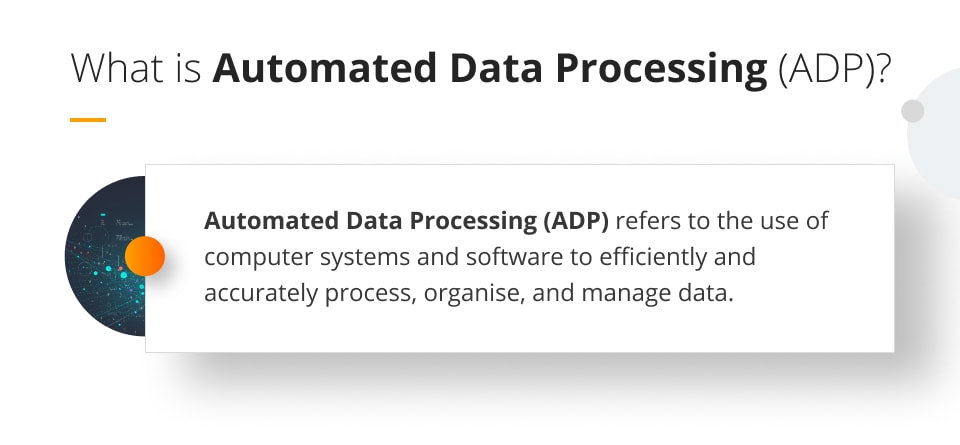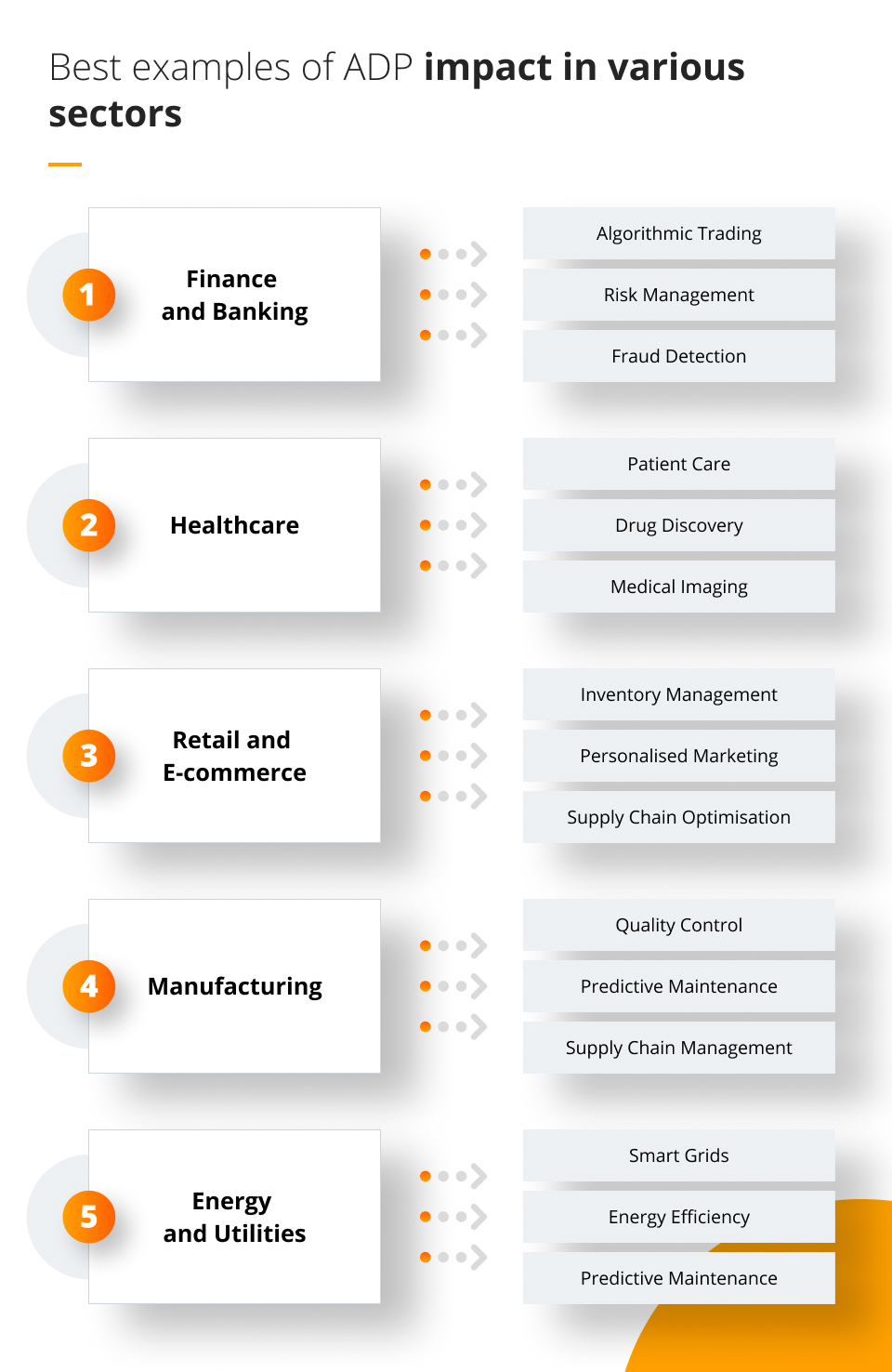
Automated Data Processing (ADP): a tool for scalability and growth
Automated Data Processing is one of the most important tools businesses should use. Let's look at it in more detail.
What is Automated Data Processing (ADP)?
Automated Data Processing (ADP) refers to the use of computer systems and software to efficiently and accurately process, organise, and manage data. It encompasses a wide range of activities related to handling data in a digital format. ADP systems are designed to automate and streamline data-related tasks, reducing the need for manual intervention and minimising the risk of costly errors. They are widely used in various industries, including finance, healthcare, manufacturing, and logistics.
Just imagine the world two hundred years ago – back then no-one had computers that would help them register data such as customers’ names, addresses, needs, purchases. All had to be done manually. With the new era of technology and with the ever-increasing amount of data being produced and processed on daily bases, such a dated system would never allow any organisation to grow in a way modern enterprises grow today.
Automated Data Processing – who is it for?
Are you thinking who automated data processing is for? Simply put, it’s for your business if you are keen to be relieved from manual, error-prone and repetitive tasks such as data collection, cleaning, integration, and analysis. You can make use of it every time you need to prepare a report or enter a large amount of data. It makes your operations much more efficient and smooth.
Benefits of ADP
According to McKinsey, about 50% of work can be automated – their latest survey confirms nearly 31% of businesses have already fully automated at least one function. A report by Zapier says 90% of knowledge workers confirm automation has improved people’s lives in the workplace. The same survey states 88% of small business owners say automation allows their company to compete with larger companies. Why is that?
Such positive feedback regarding automated data processing tools is due to the benefits they offer. Here are some main ones to consider:
ADP enhances productivity
By automating repetitive and time-consuming data-related tasks such as data entry, validation and processing, data automation frees up employees to focus on more strategic and value-added activities, allowing them for better efficiency and time-savings. Automation reduces the risk of human errors in data handling, allows for faster decision-making and enhances data accuracy.
ADP allows to avoid data silos
Data silos occur when data is isolated or compartmentalised within different departments or systems, making it challenging to access and share information across the organisation. Implementing data automation can help break down these silos and foster better data integration, leading to several benefits, such as centralised data storage, improved data accessibility, enhanced collaboration, consistency in data, real-tome integration, streamlined workflows and efficient reporting.
ADP tools improve integrity and data security
Automated data processing is key for organisations looking to effectively manage and protect their data. It reduces the likelihood of human errors in data entry and processing tasks, it ensures better data validation and can include audit trails and access control. It also guarantees timely updates and data backup and recovery.
ADP guarantees automating data compliance
Data compliance is essential for meeting legal requirements, protecting sensitive information, and maintaining the trust of customers and stakeholders. By automating data compliance processes, organisations can better manage regulatory risks, reduce the likelihood of non-compliance, and ensure the protection of sensitive information. This not only helps avoid legal penalties but also fosters trust among customers, partners, and stakeholders by demonstrating a commitment to data privacy and security.
ADP reduces human errors
The ability to reduce human errors is one of the most important benefits of automated data processing. It ensures consistency, accuracy, and efficient data handling, not only improving the quality and reliability of data but also enhancing productivity and reducing the potential costs and consequences associated with errors, such as financial losses, compliance violations, and damage to reputation.
Key aspects of Automated Data Processing
As we already mentioned, automated data processing is extremely valuable in very specific situations. They include data collection from various sources, data entry, data cleaning and validation done by identifying and correcting errors such as missing values, duplicates or inconsistences. It also serves data transformation into different formats, like when you need to convert text data into numerical values; it is extremely helpful in data analysis, reporting and visualisation or in decision support.
Automated Data Processing: examples
ADP is making a significant impact in various sectors. Let’s have a look at some of the best examples:
- Finance and banking:
- Algorithmic trading: ADP tools enable real-time data analysis, helping financial institutions make split-second trading decisions based on market trends.
- Risk management: These tools enhance risk assessment through complex data analysis, reducing the chances of financial crises.
- Fraud detection: ADP systems can quickly identify unusual transactions or patterns, helping prevent and detect fraudulent activities.
- Healthcare:
- Patient care: ADP systems streamline patient data management, improve treatment recommendations, and enhance patient care through predictive analytics.
- Drug discovery: Pharmaceutical companies use ADP tools for data analysis in drug discovery, significantly reducing the time and cost of bringing new drugs to market.
- Medical imaging: ADP assists in interpreting medical images like X-rays and MRIs, aiding in quicker and more accurate diagnoses.
- Retail and e-commerce:
- Inventory management: ADP systems optimise inventory levels, reducing carrying costs and ensuring products are available when customers need them.
- Personalised marketing: An automated data processing software can analyse customer data to create personalised shopping experiences, increasing sales and customer loyalty.
- Supply chain optimisation: ADP tools improve supply chain visibility, helping companies track products from manufacturer to consumer.
- Manufacturing:
- Quality control: Data automation systems monitor manufacturing processes, identifying defects in real time and reducing production errors.
- Predictive maintenance: Predictive analytics help manufacturers anticipate equipment failures and perform maintenance before breakdowns occur, reducing downtime.
- Supply chain management: These tools optimise the supply chain by predicting demand, reducing lead times, and minimising excess inventory.
- Energy and utilities:
- Smart grids: ADP systems play a vital role in managing smart grids by collecting and analysing data from various energy sources and distribution networks.
- Energy efficiency: ADP tool help organisations optimise energy consumption by identifying inefficiencies and suggesting improvements.
- Predictive maintenance: ADP tools are used in the maintenance of critical infrastructure, such as power plants and pipelines, to reduce costly downtime.
Other sectors, such as transportation and logistics, agriculture, education, government and public services also take advantage of data automation, optimising their operations and offering their clients always better services.
Why should your business invest in Automated Data Processing system?
Investing in an automated data processing system can offer numerous benefits to your business, regardless of its size or industry. It is very likely it will improve your organisation’s efficiency, enhance data security. and allow you to save money and make faster decisions. Simply put, an investment in automated data processing systems can yield substantial returns by improving efficiency, reducing costs, enhancing data quality, and positioning your business to thrive in a data-driven world. It’s a strategic move that can help you stay competitive and meet the evolving demands of your industry.
If you are keen to know more about benefits of data automation in your particular case, do get in touch. We will be happy to go through your plans and help you decide which direction to take.






